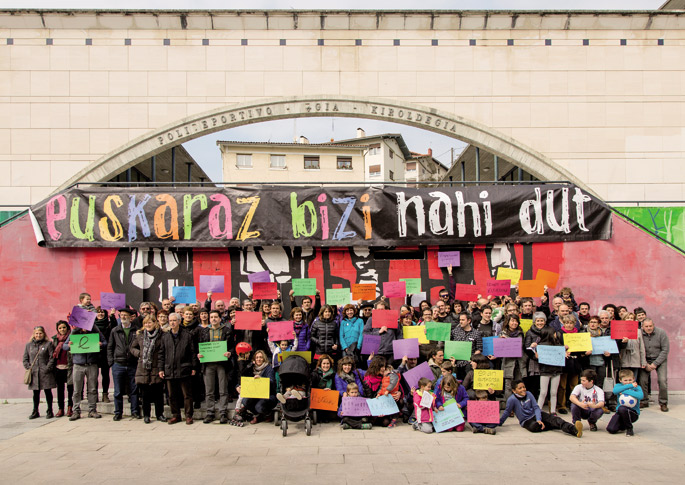
- Barrio Egia de Donostia-San Sebastián. From January 8th to March 4th, residents and neighbors committed to working in Basque for themselves and agents for a week. About 200 people have participated in the Egian Euskaraz Nahi Dugu initiative. They have come out to the streets and those who know Euskera, those who do not know, those who walk halfway... It has made it clear to all of them that they want to speak in Basque. They were afraid of people's reactions, but they had a better reception than expected. They have also been surprised, seeing how far they can go by keeping the Basque country.

In the opinion of the promoters of the Egian Euskaraz Bizi Nahi Dugu initiative, “what happened in Egia has been absolutely enriching for a month and a half. Without fear of being mistaken, it can be said that such an experience has never been implemented in the Basque Country.” The official closing feast of Aste Nagusia bilbaína was held on 12 March. The initiative is over, but many neighbours have made small commitments and from now on will try to deliver on them.
Egia has passed the witness to the Añorga district. It has about 2,000 inhabitants and is one of the most Euskaldunes in Donostia-San Sebastián. A popular assembly will soon be held and the crews are already beginning to move.
The association of Euskera Bagera de Donostia-San Sebastián hopes that the initiative will extend to more neighborhoods of the city. The Association will not be responsible for organising the initiative in the neighbourhoods, but if it has two functions: on the one hand, taking into account the experience of Egia, it will draw up a practical guide to organize the following and, on the other, it will promote the implementation of the initiative by the neighborhoods.
Experiences of speaking in Basque
Idurre Beobide, AMPA Latxaga de Aitor ikastola: “Someone told me, ‘you think I don’t understand you but I adapt’, and I’m asked to speak in Basque. ‘Idu euskaraz!’, but I have internalized the lack of respect and I find it hard to speak in Basque”
Nerea Txapartegi, professor at ikastola Aitor: “My next challenge is those who say ‘I am in Spanish’. I would like
to know how far they go in Euskera.” At the ikastola they say: ‘We do everything in Basque!’ With vasco-parlant parents? Do we teachers try to speak in Basque when we telephone those parents or do it directly in Spanish?”
Amaia Beristain, neighbouring: “I found it difficult. The answers that give us -- and especially the looks. Anyway, they have to change.”
Lutxo Egia lived a month in Bilbao without using Spanish: “I’ve realized that things have happened to me: as language habits changed, shocks occurred, not necessarily negative, and we’ve learned how to manage those shocks. There has also been a surprise: our interlocutors were surprised when we not only spoke the first word, but also the second and third, and we were surprised to see how far we have come, that we are heading to Spanish and that we do not have to use it many times”.
“It starts in Basque with the acquaintances we have made in Basque. Know your level of knowledge or understanding and make the conversation bilingual. Start with those who are not first known in Basque and try to continue speaking in Basque, with or without a level of knowledge. If it cannot continue, decide what to do, depending on its importance. Take the effort seriously, but as a game or an adventure”
“There is much to do with adolescents, also the most Euskaldunes, at 14-15 years old, are expanding relationships and transforming”
“It’s an exciting initiative to know that I will share this personal attitude with other people in the neighborhood. We have come to the plaza with the Basque in the mouth, and we do not want to stay in the scheme of a party that is made for the Basque. We will speak in Basque, and very simple”
“The exercise of the week has been very good to reflect on our ‘bilingualism’. From now on I have committed myself to always making the first word in Basque. In the shops it has been easier to do it in Basque than in my crew”
“I’ve realized that I use Spanish more than I thought, so from now on I have to make the chip change. On the other hand, I have realized that I can communicate only in Basque”
“Today I have spent half a day with a member of my family who understands Euskera well but is not easy to speak and in the end has been a rather uncomfortable situation. We usually speak in Spanish, and today we have both talked a lot in Basque, but he had difficulties”